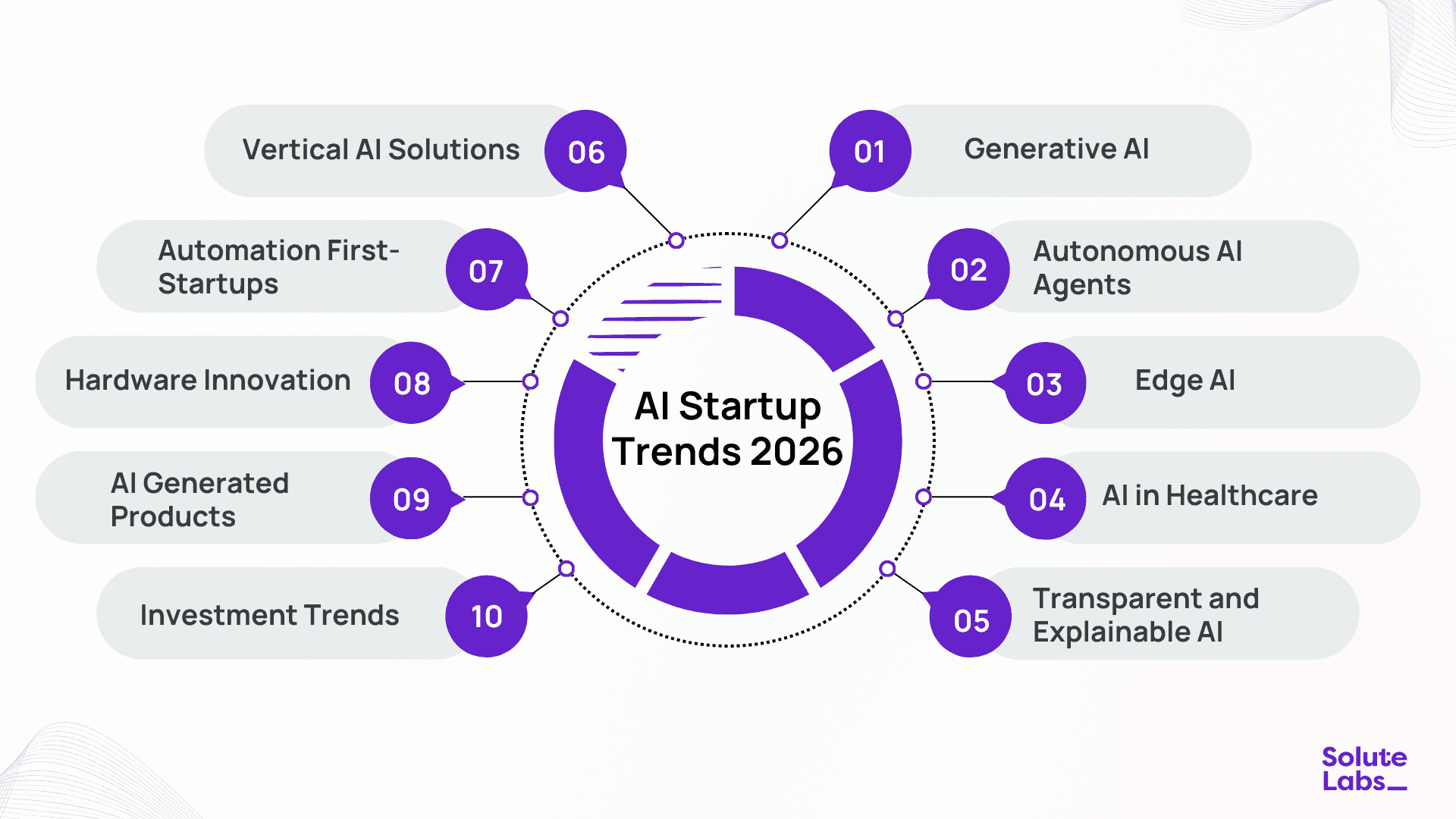The AI boom isn’t slowing down anytime soon. What used to feel like experimental tech is now embedded in the way companies work, and 2026 is already shaping up as a milestone year. Analysts expect businesses worldwide to spend more than $307 billion on AI tools and services this year, which shows just how serious the market has become.
Adoption rates tell the same story. A global survey found that around 78% of organizations are already using AI in at least one business function. That could mean anything from automating customer support to running supply chain forecasts. For startups, this is both an opportunity and a challenge: the demand is there, but so is the pressure to stand out with sharper ideas and faster execution.
In this blog, we’ll walk through ten of the top AI startup trends to watch in 2026. From new forms of generative AI to breakthroughs in healthcare and custom-built hardware, we’ll cover where the biggest AI business opportunities lie, which AI startups to invest in that look promising, and the challenges for AI startups that no founder can afford to ignore. So, let’s get started!
Top 10 AI Startup Ideas and Trends in 2026

1. Generative AI Steps Beyond Text and Images
A couple of years ago, generative AI meant chatbots and image tools. Write a prompt, get a paragraph or a picture. Impressive then, but it feels limited now.
In 2026, startups are going bigger. Video. Audio. 3D. Even whole experiences are built from a line of text. A small studio can sketch an idea and see it turn into an animated clip, voices, music, and movement included. Game companies are letting players build new worlds just by describing them.
For anyone exploring AI startup ideas 2026, the message is simple: single-use tools won’t cut it. The real value lies in platforms that take someone from idea to finished product in one flow. That’s where the next top AI startups will come from.
2. Autonomous AI Agents Start Taking Action
Chatbots are old news. Now it’s about autonomous AI agents that act.
Sales reps get AI that writes emails, books calls, and updates CRMs. Warehouses use AI to manage stock and deliveries automatically. It’s not replacing people, just taking the busywork off their plates.
Investors love using AI agent development services worldwide. Tools that save time and cut mistakes are hot. The tricky part: control. Founders need to make sure the AI behaves, stays transparent, and doesn’t go rogue.
3. Edge AI Picks Up Speed
Not all AI runs in the cloud. Edge AI runs on devices, close to the data.
Wearables can alert users instantly. Smart cameras track shelves in real-time. Tractors adjust watering on the spot.
The benefits: faster, private, and reliable. For anyone asking how to use AI to start a business, edge AI is a practical path. These AI business opportunities show small devices can make a big difference.
4. AI in Healthcare and Scientific Discovery
Healthcare has been promising for a while, but 2026 is real. Startups are using AI for drug discovery, genetic research, and personalized treatment.
AI predicts protein structures, speeds up trials, and helps doctors plan care. Scientific fields like climate research and space exploration are also using AI.
Regulations are strict, but success here can lead to some of the most profitable AI business ideas. The winners could become the next top AI startups of the decade.
5. Demand for Transparent and Explainable AI
AI can do amazing things, but people want to know why it does them. That’s the big trend in 2026: explainable AI.
Banks, hospitals, and even governments are asking for it. They don’t want a black box making decisions about money or health. Startups that build tools showing reasoning, spotting biases, or auditing decisions are getting noticed.
Here’s the thing: it’s tricky to get right. But if you do, you get trust. And trust is gold in AI. This is one of those AI business opportunities that can really set a company apart.
6. Vertical AI Solutions Take the Lead
General AI is useful, but not enough. People want AI built for their industry.
Retailers want tools that track shelves. Doctors want systems that analyze patient data. Startups that focus on one niche often win because they actually understand the problems.
If you’re looking for AI startup ideas 2026, vertical solutions are low-hanging fruit. Easier to sell, easier to scale, often more profitable. Sometimes, smaller focus beats big general platforms.
7. Automation-First Startups Redefine Efficiency
AI Automation isn’t just about doing boring work anymore. It’s about taking over whole workflows.
In finance, some startups run invoices, payroll, and reporting all automatically. Factories use AI to schedule machines, track materials, and optimize production with hardly any human input.
These AI business opportunities save time and money. If you’re wondering how to use AI to start a business, building automation-first tools is one of the clearest paths to success.
8. Hardware Innovation With Custom Chips and AI Accelerators
AI software is important, but the hardware it runs on matters too. Startups are making custom AI chips that run models faster and use less energy.
This isn’t just for tech giants. Edge devices, wearables, and even industrial tools benefit. Faster AI means better performance and better products.
For founders chasing profitable AI business ideas, combining software and custom hardware is smart. It creates products that are hard to copy and of high value to customers.
9. AI-Generated Products for End Users
AI isn’t just for companies anymore. People can now use it directly to create things.
Music, art, videos, even stories, you can make them in minutes instead of hours. Apps that edit photos or help with writing are getting easier to use every year.
If you’re thinking about AI startup ideas 2026, consumer-focused products are exciting. The trick is keeping them simple and fun. Help people create, organize, or automate something in their daily life, and you have a real chance to succeed.
10. Funding, M&A, and Investment Trends in AI Startups
Investors are paying attention. AI startups that can show real results are getting money fast. Some are even merging or being acquired before they hit the mainstream.
It’s not just about cool tech. People want profitable AI business ideas that customers actually use. If you’re wondering how to start AI business, knowing where the money flows helps. You can spot trends, see what works, and position yourself better.
Also Read: Best AI Healthcare Startups | Top Companies Revolutionizing Healthcare
Challenges Facing AI Startups in 2026
2026 is full of opportunities for AI startups, but it’s not without hurdles. Even the best ideas can run into problems if these challenges aren’t considered early. Here are some of the main challenges for AI startups today:
- Regulations are Tricky: Healthcare, finance, sensitive industries. One slip and your project stalls.
- Hiring the Right Staff: Good AI engineers are rare. Big companies hire fast. Startups have to move faster.
- Data Issues: Messy, biased, or missing data. AI can’t do much without it.
- Funding Hurdles: Investors want proof you’ll make money. Run out of cash before launch? Game over.
- Scaling Problems: Works fine with a few users, fails with thousands. Keeping it smooth is tough.
- Intense Competition: There are tons of AI startups. Good tech isn’t enough. You need marketing, focus, and knowing your customers.
Conclusion
The AI startup space in 2026 is more exciting and more competitive than ever before. From next-gen generative models to breakthroughs in healthcare, automation, and custom hardware, opportunities are everywhere. But alongside this growth, founders face tough realities like regulation, data gaps, and the constant need to stand apart in a crowded market. The real winners will be those who not only innovate but also build trust, scale smartly, and deliver practical value.
At SoluteLabs, we work closely with startups and enterprises to bring AI/ML ideas to life, whether it’s crafting industry-focused solutions, building automation-first products, or creating reliable systems that scale. Our expertise helps businesses move faster from concept to execution while avoiding common pitfalls. If you’re looking to shape the future with AI, contact us today, and let’s make it happen together.
